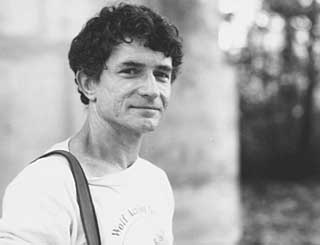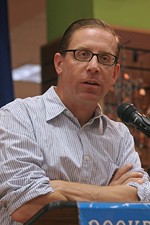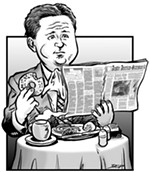Media Clips
Statesman Doesn't Let Facts Get in the Way of a Good Story
By Lee Nichols, Fri., Nov. 26, 1999

Well, he had the decency to at least partially apologize. On Sunday, Rich Oppel, editor of the Austin American-Statesman, admitted to at least one of his screw-ups regarding his paper's recent attempt to tar and feather environmental activist Tim Jones. As The Austin Chronicle pointed out in our "Page Two" column last week, Oppel's Nov. 14 column misportrayed a paraphrase from a county prosecutor -- in her attempt to get Jones to incriminate himself on the witness stand in his trespassing trial -- as being a direct quote from Jones himself. After learning of his mistake, Oppel printed an apology to Jones last Thursday, and repeated it this Sunday. But he didn't go far enough: "As for the rest of the column and my opinions therein, they stand."
But upon what do they stand? On distortions of facts, quotes taken out of context, and even outright lies.
This week in "Media Clips," we examine the Statesman's Tim Jones series bit by bit and compare it with the actual tapes the local daily used to make its damning attacks on Jones. Feel free to listen to the three tapes while you read along -- we made them available on our Web site at http://www.auschron.com/issues/dispatch/1999-11-19/cols_pagetwo2.html. If you don't have access to the Internet, the tapes are available to the public from County Attorney Ken Oden's office.
The First Salvo
The Statesman's crusade against the evil menace that is Tim Jones began on Nov. 9, when the daily ran a front-page, above-the-fold story alleging that Jones -- a longtime environmental activist and City Council Member Daryl Slusher's appointee to the city's Environmental Board -- had been caught on secretly taped phone calls asking a developer for a job and "suggesting that he could influence state and city regulators to intensify or reduce their scrutiny of Barton Creek Properties" depending on whether the developer would drop a trespassing charge against him. The next day, the front of the Metro section followed up with the blaring headline, "Jones backer asks for ethics investigation."
Judging by the placement of both stories, it was clear the Statesman thought environmental reporter Ralph K.M. Haurwitz had uncovered quite a scandal -- though this was two-and-a-half-year-old news that had been hashed over at the time it occurred -- and Statesman editor Rich Oppel, in the regular Sunday column which lately has been his personal environmentalist-bashing pulpit, declared, "Tim Jones, it's time to go."
Let's start at the beginning: "City official asked developer for job" was the initial headline, followed with the subhead "But Environmental Board member, whose phone calls were taped, says he did no wrong." The tone has been set -- if Jones says he did no wrong, then that presupposes that there is at least reason to think that some wrong has been done.
And then Haurwitz's opening paragraph: "A member of Austin's Environmental Board urged a developer to hire him as a watchdog for Barton Creek, suggesting that he could influence state and city regulators to intensify or reduce their scrutiny of Barton Creek Properties [BCP], according to tape recordings."
The first half of that sentence is quite correct -- on the tapes, which were recorded by BCP attorney John Foster without Jones' knowledge, Jones does indeed suggest, several times, that BCP should hire him. The second part, however, regarding Jones' supposed influence and motivations, requires a much closer look at Jones' actual words rather than just the soundbites which Haurwitz provides.
Haurwitz's insinuations of influence-peddling revolve around one Jones quote which can be found 11 minutes and five seconds into tape two: "We do have a case pending, and we can make that into something, you know, a big deal. Or I think you should drop the -- I would appreciate it if you'd drop the charges. If you drop the charges, I'll try to work with you the best I can."
Mighty dastardly, no?
Well, no. Listen to what Jones says before and after:
The conversation begins with Jones warning Foster that other regulators are preparing to pursue an enforcement action on BCP. Jones offers the warning not because he thinks he can get some financial gain from brokering a deal, but because he genuinely doesn't believe BCP is the problem. Jones is famous for patrolling Barton Creek with a video camera during heavy rains and catching runoff from construction sites on tape, and on April 18, 1997, a Jones tape of runoff from BCP resulted in a $1,080 fine from the Texas Natural Resource Conservation Commission against FM Properties, the owner of BCP. However, about a week later, Jones videotaped runoff coming from a city of Austin construction site -- but got arrested for trespassing on BCP land in the process, which is what led to the Jones/Foster conversations.
At this point, Jones has decided that BCP had at least partially cleaned up its act, but because of the trespassing case, he says, he can't pursue investigations further up the creek. Go 4:18 into tape three, and you hear this passage:
"This situation is annoying me a lot, because I have a problem upstream of your property, and I'm hooked onto this deal with you guys. I went out there yesterday on our side of the creek and I looked at the Pod 9 draw and super-muddy water was coming down the creek -- past Hwy. 71, I don't know where it's coming from, I'm trying to get a plane and fly over the whole watershed. -- I've gotta go look at that. -- [From] you guys, I did not discern a further pollution of Barton Creek yesterday. -- I'm all tied up and concerned with this situation [the trespassing charge] when I have got to move on. I'm past you guys now. -- I like you. You talk to me. You seem like a reasonable person." (The frequent ellipses are not to hide anything, but to help clarify some of Jones' rambling style of speech; like we said, listen to the tape for yourself -- it's all there).
On tape two, the "we can make it into a big deal" quote is preceded by this (5:15):
"What we've got to do is get these contractors [under the employ of BCP and others] under control," Jones says. "I'm not interested in retaliation and this back and forth and the politics very much. I would like to see the regulatory process work better. That's what I as an Environmental Board [member] -- I'm very serious about what I do. I'm not playing games with it. I want to figure out how to get the contractors to conform to -- voluntary environmental code enforcement. And we're doing it. [But] we're doing it the hard way. -- We need to work together on this and acknowledge exactly and be very truthful about who's doing what."
Jones then takes Foster to task for a "water quality protection zone" that BCP got passed at the Legislature to exempt the development from Austin's water quality laws, noting that it didn't provide the exemplary water quality that BCP said it would. In order to get that type of water protection, Jones said, "We need to negotiate."
When Foster asked what they had to negotiate, Jones, after a long pause, said, "To try to not be so adversarial. Maybe you should hire me instead of prosecuting me in some way. -- I recognize a problem with enforcement on contractors. It's beginning to happen that other developers are seeing this too. They're getting black eyes because of somebody else's action." While the Statesman printed the "Maybe you should hire me" sentence, they left out the sentences before and after.
The gist of all this is: Jones, with touching naivete, thinks that after getting BCP busted for a big fine he can then get them to work with him on cleaning up the creek. He even thinks that, after pointing out how BCP's own inspectors aren't getting the job done, the company might actually recognize his own supposedly superior inspecting skills, make nice, drop the charges, and join forces with him (by hiring him) to keep an eye on their contractors.
But peddling influence? Well, Jones does indeed promise to get the regulators off BCP's back, but in an ingenious way -- by helping them and their contractors conform to the law and protect the creek. (Voluntary compliance? Sounds like George W. Bush would love this guy.) "A lot of contractors and developers can appreciate somebody that can see these things and capitalize on an ability to do discovery of problems, which is what I do, and then fix it themselves," Jones says. "If I find it, I'll tell you first. You ought to hire me. [You could] say, "We've got a guy out there, we don't know when he's gonna show up. [If] he finds a problem, he's gonna come in there, he's gonna identify that problem, he's gonna videotape it, and you contractors better look out 'cause he'll nail you. And then we're gonna nail you.' That would be scary to them." (14:24, tape two.)
To finish things off and drive home his insinuations of wrongdoing, Haurwitz recites two portions of the city code and city ethics policy -- thus implying that they may have been violated, without offering any evidence that that was the case -- and then wheels out a defensive quote from Slusher.
Haurwitz notes that "Austin's city code bars "any officer or employee' of the city from influencing, "by solicitation or otherwise,' another city officer or employee "to favor any particular person.'" Yet there is nothing to suggest that Jones may have done this; in fact, he tells Foster that although he wants to drop the BCP matter, "I cannot guarantee that you're gonna get cooperation from anybody else." (13:32, tape two.)
Haurwitz then tells us that "The city's ethics policy bars the use of public office for personal gain and requires city officials to disclose financial interests in matters affecting the city." This is closer to relevance -- "personal gain" could encompass either Jones getting his trespassing charges dropped or getting a job -- but it is notable that Jones' Environmental Board position only comes into the discussion insofar as it compelled him to make his creek inspections, and any suggestion of a job was based on what any application for employment should be: his skills at discovering pollution. As for "disclosing financial interests," Jones never came close to taking a position at BCP, so it's hard to imagine what there would be for him to report.
Then Slusher's quote: "I would prefer to hear the tapes before commenting [according to Slusher, the Statesman then refused to allow him to listen to the tapes]. In general, I do not think it's proper to use a board position to solicit employment or influence any investigation." Which, as we just said, Jones did not do. Again, it's accusation by omission: Slusher, asked if such actions are improper, agreed that they were; only the story's context suggests that they actually occurred.
In fairness to Haurwitz, most of these points were included in his article. But unlike here, they were presented incompletely, and all under the presupposition that some wrongdoing had occurred. In that context, the tenor of the conversation changed. On the tapes, Jones can be heard bargaining with Foster on how they best can cooperate to protect Barton Creek. In Haurwitz's article (and in the Nov. 10 follow-up by Christian Davenport), it instead sounds like Jones is trying to cut a deal in exchange for illicit favors.
Coughing Up Granola
Then we come to Oppel's Sunday editorial, titled "Tim Jones, it's time to go." Here, Oppel takes Haurwitz's ball and runs with it -- and along the way gets flagged for several penalties and ultimately smashes into the goal post.
First, there's the matter of the phantom quote. Oppel wrote:
You've got to grin. Over at the Earth First treehouse, the knuckle-dragging wing of the environmental movement must be coughing up granola as they listen to Jones wheelin' and dealin' with the developer's man.
"Hey let me on," said Jones, begging for the chance to cover up pollution spills for money. "If I find something, I'll tell you, and it will be kind of below the radar screen. We'll work it out, and we'll never report it to all these government authorities."
The part attributed to Jones was actually a paraphrase from a county prosecutor cross-examining him in his trespassing trial earlier this year, as the Statesman admitted in a page A2 correction on Nov. 18, after the Chronicle brought it to their attention. The prosecutor then asked Jones, "Isn't that right?" To which Jones, who we have no doubt was completely befuddled (listen to the guy talk; you'll understand what we mean), replied "Right."
The Statesman then lamely offered the defense that, "The county attorney's office said that under the rules of evidence, "a statement in which the party has manifested an adoption or belief in its truth amounts to an admission by law.'"
To Oppel's credit, he backed down from this defense on Sunday, writing, "But while the quote-by-adoption may be the same as a direct quote under the rules of evidence, it isn't the same journalistically."
But as we said, the misattribution of the quote was the only thing which Oppel retracted. Therefore, he presumably still stands by his assertion that Jones was "begging for the chance to cover up pollution spills for money." Tell us, Mr. Oppel, where is this on the tape? Where? (We'll help you: It isn't. No more so than your phantom quote is.)
And he still stands by his characterizations of these conversations as "blackmail," a "shakedown," and "extortion." So where on the tapes is this, exactly? What, specifically, was Jones' threat? (We'll help you again: There wasn't one. Instead, we hear Jones praising BCP for cleaning up its act, and offering to help argue their case before the other regulators. But first, he sensibly insists, BCP would need to drop the trespassing charge accrued in the process of the investigation which exonerated BCP!)
Oppel finished up -- with the aid of an unflattering illustration by Ben Sargent -- by accusing Slusher of first performing spin control for Jones by praising his diligent work on behalf of Barton Creek, and then saying that Slusher "altered his tune" after Haurwitz's story.
Of course, Slusher did nothing of the sort. He did ask that the city Ethics Commission take a look at the issue, but as Oppel was well aware, that was at Jones' request, because it was clear that he would be cleared of any wrongdoing. Still, Oppel called this a hint from Slusher to Jones to resign -- "The picture is of a wishy-washy Slusher standing uneasily beside his man on the environmental board" -- though he must already have known that this was not the case. Spin control, indeed.
Slusher, having listened to the tapes himself, is now standing firmly beside his man. We hope that you'll do the same. Go ahead. Listen.
Postscript I
Unfortunately, this is most likely not the end of this matter. You, the environmentally enlightened Austinite, are fortunate to have an alternative media sources to ferret out the Statesman's deceit (that sound is us patting ourselves on the back). But The Austin Chronicle is not distributed out in the hinterlands (except online). Instead, all they see is the daily's picture of a bunch of looney tree-huggers who, obviously, are vile, corrupt, and hypocritically exploiting the environment for a buck. And in 2001, they will send their less-than-green representatives to the Legislature for another round of Austin-bashing. No doubt, the reps will be waving copies of this series as justification for their actions.Postscript II On Nov. 18, the city's Ethics Commission declined to investigate Jones, noting that no one has filed any complaint against him and that the incident occurred more than two years ago, beyond the limit within which a complaint must be filed. Haurwitz reported this the next day.
However, one had to look elsewhere for this quote from commission chair Ginny Agnew: "I thought we were being the pawn of the press, and none of us were comfortable with that." That appeared in In Fact Daily, an online webzine covering city politics (http://www.infactdaily.com) ![]()
Media tips: [email protected]
Got something to say on the subject? Send a letter to the editor.








